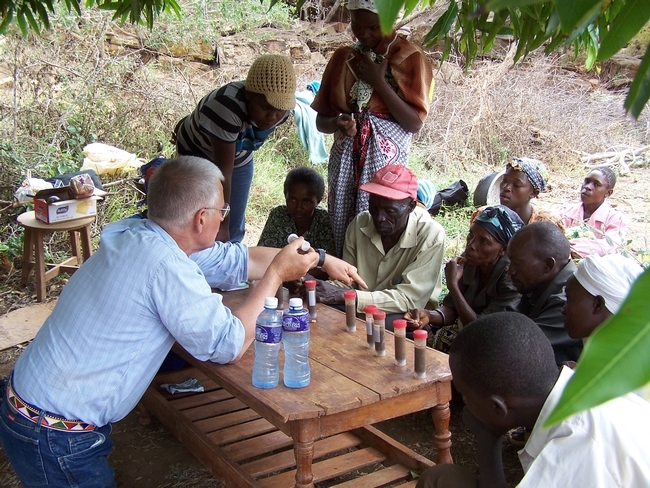Posts Tagged: Jeff Mitchell
Endive provided a career-long challenge to Rio Vista farmer/entrepreneur
There is just one commercial producer in California of endive, a missile-shaped French-Belgium sprout from a chicory root that boasts culinary versatility, but lacks popularity. Endive (pronounced on-deeve) adds a bitter bite to salads and stir-fries and its white leaves make little boats to hold other ingredients for dainty hors d'oeuvres.
The biggest challenge for an endive producer, said entrepreneur Rich Collins, is marketing a product unfamiliar to most Americans. On average, U.S. consumers eat four leaves of endive a year; in France per consumer consumption is about 8 pounds a year, and in Belgium double that. Collins spent this morning touring about 50 food bloggers who are in Sacramento for the International Food Bloggers Conference around his endive operation so their increased awareness of this specialty vegetable will translate to greater appreciation among their readers.
Collins was introduced to endive in 1978 while working as a dishwasher in a Sacramento restaurant. The owner said he paid $4 a pound for imported endive and challenged Collins to grow it in California. Collins went to Europe as a "horticultural vagabond," he said, to learn the ropes. Back in California, Collins began producing endive in 1982, and never stopped.
"It took 10 years to learn how to grow endive in California," Collins said. "It's not an easy crop to grow."
The primary pest concern is bacterial or fungal problems since the sprouts are forced in a warm, moist environment. Early on, Collins got help from Robert Kasmire, UC Cooperative Extension post harvest specialist at UC Davis. A portrait of Kasmire hangs prominently in the California Endive Farms facility in Rio Vista.
"He helped me out quite a bit," Collins said.
Today, the company he built supplies 50 percent of the U.S. endive market. The California Endive Farms ships its products weekly year-round to Trader Joes and Whole Foods markets.
For Collins, however, it's now time to retire. He sold California Endive Farms to the grandson of one of his production mentors in France, but he won't be leaving agriculture.
This week, Collins sat down with UC Cooperative Extension specialist Jeff Mitchell to plan his retirement on a 200-acre farm he and his wife own near UC Davis. Mitchell is chair of the UC Conservation Agriculture Systems Innovation Center, which promotes the use soil care practices to improve carbon sequestration, reduce dust emissions, save water and increase yield in agricultural production systems. The practices can include no-till and minimum tillage farming, cover cropping, enhancing the diversity of above-ground species and underground soil biology, surface residue preservation, and compost applications.
Currently Collins grows 30 acres of asparagus and allows four young farmers to use space on the property to get started in agriculture.
"We now want to get in the realm of soil development," Collins said.
UC researchers share knowledge in Kenya’s Kitui District
In June of this year, three University of California scientists went to the Kitui District of Kenya on a USAID mission.
Food and water scarcity are simply a part of life for most in this region. Since 1992 the Sahelian Solution Foundation (SASOL) has been constructing dams and working with Kitui communities to address water scarcity and issues of community development and agricultural production.
Agricultural production in Kenya is full of challenges. Water is carried by hand from wells or dams for household and agricultural needs. Previous to this mission, crops were watered inefficiently by flooding small basins. Nitrogen tests in some locations revealed levels at which most vegetable crops would be nitrogen deficient. Some of the villages have no road access.
UC’s Steve Fennimore, Jeff Mitchell, and Oleg Daugovish went to help SASOL and the people they serve make better use of their resources.
They met with village leaders and SASOL personnel in Kitui. Here they provided training and demonstrations covering topics including:
- Demonstrations of gravity-flow drip irrigation systems from water tanks to individual beds with irrigation lines
- Discussed use of mulches on soil to minimize evaporation and enhance soil conservation
- Solarization, nursery for transplants, diseases and insects, training tomato plants and culture
- Soil types, determination of soil moisture, quick nitrogen test, use of cover crops and mulches
- Water quality (pH, hardness, salts), organic fertilizers, collection and use of urine as a rapidly available nitrogen source.
Later the information was shared in the Maito village, where onions, green kale and green grams (Phasleolus aureus) are grown. The next day found the group in the Kituvwi village, where due to poor crop production, meals are currently limited to once a day. The following day was spent in the Kathayoni village. Farmers in the Kathayoni village grow kale, onions and tomatoes.
SASOL will continue the training for members in villages not reached during this visit.
The majority of farmers in the Kitui District are women. Information was well received in all locations and many questions were asked. At each village the scientists were fed a stew of corn and beans, supplemented by avocado slices or bread, with tea and milk to drink.
The last day time was spent at the South East University College. Potential for agricultural experimentation and greenhouses was discussed, and UC scientists gave a seminar about UCCE function and on anaerobic soil-borne pest control.







